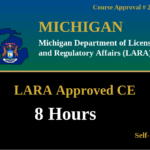
Does Michigan Offer Electrical License Reciprocity?
The Straight Answer: Michigan’s Stance on Reciprocal Electrical License Agreements
Let’s be direct: Michigan does not offer direct, automatic electrical license reciprocity with any other state. According to the Michigan Department of Licensing and Regulatory Affairs (LARA), you cannot simply swap your out-of-state license for a Michigan one. However, this doesn’t mean your years of hard-earned experience are invalid. Instead of reciprocity, Michigan has a formal process for evaluating your credentials to determine if you are eligible to sit for the state’s licensing exam.
This process is managed by the LARA Electrical Division and the Michigan Bureau of Construction Codes (BCC). They have established a pathway for an out-of-state electrician license in Michigan to be recognized as qualifying experience. The key takeaway is that all electricians, regardless of where they were previously licensed, must pass the Michigan electrical exam to prove their competency with state-specific regulations and the Michigan electrical code.
The Path to Licensure: How to Transfer Your Electrician License to Michigan
While not a direct swap, the process to transfer an electrician license to Michigan is clearly defined. It involves three main steps: documenting your experience, submitting a comprehensive application, and passing the state examination. This ensures that every licensed electrician, whether trained in-state or out-of-state, meets Michigan’s high standards.
1. Document and Verify Your Experience
The first and most crucial step is proving your experience meets Michigan’s requirements. LARA’s Electrical Administrative Board reviews out-of-state applications to grant credit for experience earned elsewhere. To do this, you must complete the Michigan electrical license application and provide notarized letters from past employers detailing your work history. You’ll also need to submit an “Out-of-State License Verification” form, which must be completed by the licensing board of every state where you’ve held a license. This electrical license verification Michigan process is how the board confirms your qualifications.
2. Understand Michigan’s Licensing Tiers
Michigan has distinct requirements for its primary license types, and you must apply for the one that matches your qualifications. It’s critical not to assume the requirements are the same.
- Michigan Journeyman Electrician License: To qualify for the journeyman exam, you must document at least 8,000 hours of practical experience obtained over a minimum of four years. Credit may be given for completing a formal electrician school or apprenticeship program, which can often substitute for a portion of the required hours.
- Master Electrician Michigan License: To be eligible for the master electrician exam, an applicant must have held a journeyman license for at least two years and can document a total of 12,000 hours of practical experience over a period of no less than six years.
- Michigan Electrical Contractor License: This is a business license, not an individual one. To obtain it, you must either hold a master electrician Michigan license yourself or employ a full-time, state-licensed master electrician who is responsible for all code compliance.
3. Pass the Michigan Electrical Exam
Once the LARA board approves your application and verifies your experience, you will be authorized to sit for the Michigan electrical exam. The exam for both journeyman and master electricians is based on the current Michigan electrical code, which adopts the National Electrical Code (NEC) with state-specific amendments. As of March 12, 2024, Michigan has adopted 2023 NEC. Preparing for this exam is crucial, as it is the final gate to earning your license.
After You’re Licensed: Staying Compliant in Michigan
Earning your license is a major achievement, but maintaining it requires ongoing professional development. Michigan mandates electrician continuing education Michigan to ensure all licensed professionals stay current with the latest code changes and safety protocols. Per state administrative code, master and journeyman electricians must complete 15 hours of continuing education every 3-year license cycle. These courses cover critical updates to the NEC, state rules, and safety standards. Fortunately, many providers offer board-approved online electrical courses that make fulfilling this requirement convenient. Keeping up with your CE is essential for license renewal and ensures you’re providing the safest, most compliant work for your clients.
Why Portability Matters More Than Reciprocity
The concept of reciprocal electrical license agreements is appealing, but in a trade governed by varying local codes, true portability is often more valuable. For electricians moving to Michigan as an electrician, a well-documented career history – including detailed work logs, certifications from programs like NCCER, and records from a reputable electrician school – is your most powerful asset. This documentation is the evidence LARA needs to approve you for the exam.
Ultimately, a lack of direct reciprocity shouldn’t deter you. Michigan’s strong job market and competitive salaries make it an attractive destination. By understanding and following the state’s established process for out-of-state applicants, you can successfully transition your career and capitalize on the opportunities available.
Related Resources
Frequently Asked Questions
- Does Michigan have electrical license reciprocity with any other state?
- No, Michigan does not have direct reciprocal agreements with any other state for electrical licensing. All out-of-state applicants must have their experience verified and pass the state exam.
- What code is the Michigan electrical exam based on?
- All Michigan electrical examinations are currently based on the 2023 National Electrical Code (NEC), the 2023 Michigan Electrical Code Rules Part 8, and associated state acts and rules.
- Can I work as a residential electrician in Michigan with an out-of-state license?
- No, you cannot legally perform electrical work that requires a license in Michigan using only a license from another state. You must first obtain the appropriate Michigan license, such as a journeyman or master license, by meeting the state’s application and examination requirements.
Michigan Continuing Education Courses
Explore our board-approved continuing education courses for Michigan professionals:
View CE RequirementsMichigan – 15 hours NEC 2023 Code Changes Update
Michigan – 8 hours NEC 2023 Changes for Sign Specialist
Disclaimer: The information provided in this educational content has been prepared with care to reflect current regulatory requirements for continuing education. However, licensing rules and regulations can vary by state and are subject to change. While we strive for accuracy, ExpertCE cannot guarantee that all details are complete or up to date at the time of reading. For the most current and authoritative information, always refer directly to your state’s official licensing board or regulatory agency.
NEC®, NFPA 70E®, NFPA 70®, and National Electrical Code® are registered trademarks of the National Fire Protection Association® (NFPA®)





